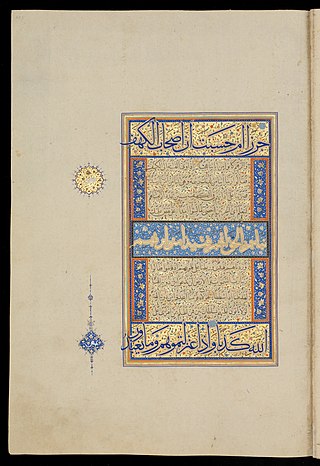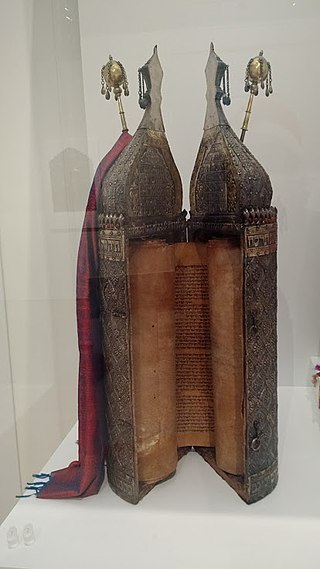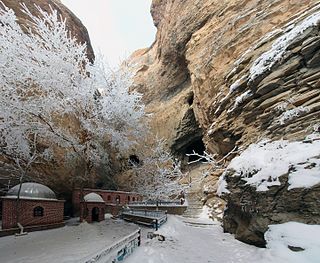Related Research Articles

The Quran, also romanized Qur'an or Koran, is the central religious text of Islam, believed by Muslims to be a revelation from God. It is organized in 114 chapters, which consist of verses. In addition to its religious significance, it is widely regarded as the finest work in Arabic literature, and has significantly influenced the Arabic language.

A parable is a succinct, didactic story, in prose or verse, that illustrates one or more instructive lessons or principles. It differs from a fable in that fables employ animals, plants, inanimate objects, or forces of nature as characters, whereas parables have human characters. A parable is a type of metaphorical analogy.
A surah, is the equivalent of "chapter" in the Qur'an. There are 114 surahs in the Quran, each divided into ayats (verses). The chapters or surahs are of unequal length; the shortest surah (Al-Kawthar) has only three verses while the longest (Al-Baqara) contains 286 verses. Of the 114 chapters in the Quran, 86 are classified as Meccan, while 28 are Medinan. This classification is only approximate in regard to the location of revelation; any chapter revealed after migration of Muhammad to Medina (Hijrah) is termed Medinan and any revealed before that event is termed Meccan. The Meccan chapters generally deal with faith and scenes of the Hereafter while the Medinan chapters are more concerned with organizing the social life of the nascent Muslim community and leading Muslims to the goal of darul islam by showing strength towards the unbelievers. Except for surahAt-Tawbah, all chapters or surahs commence with "In the Name of Allah, Ar-Rahman, Ar-Rahim ". This formula is known as the Basmala and denotes the boundaries between chapters. The chapters are arranged roughly in order of descending size; therefore the arrangement of the Quran is neither chronological nor thematic. Surahs (chapters) are recited during the standing portions (Qiyam) of Muslim prayers. SurahAl-Fatiha, the first chapter of the Quran, is recited in every unit of prayer and some units of prayer also involve recitation of all or part of any other surah.
The Meccan surahs are, according to the timing and contextual background of supposed revelation, the chronologically earlier chapters of the Qur'an. The traditional chronological order attributed to Ibn Abbas became widely accepted following its adoption by the 1924 Egyptian standard edition. The Meccan chapters are believed to have been revealed anytime before the migration of the Islamic prophet Muhammed and his followers from Mecca to Medina (Hijra). The Medinan surahs are those supposed revelations that occurred after the move.

Al-Kahf is the 18th chapter (sūrah) of the Quran with 110 verses (āyāt). Regarding the timing and contextual background of the revelation, it is an earlier "Meccan surah", which means it was revealed in Mecca, instead of Medina.

An-Nur is the 24th chapter of the holy Quran with 64 verses. The surah takes its name, An Nur, from verse 35.
An-Naml is the 27th chapter (sūrah) of the holy Qur'an with 93 verses (āyāt).
The Spider is the 29th chapter (surah) of the Quran with 69 verses (āyāt).
Ar-Rum is the 30th chapter (sūrah) of the Quran, consisting of 60 verses (āyāt). The term Rūm originated in the word Roman, and during the time of the Islamic prophet Muhammad, it referred to the Eastern Roman Empire; the title is also sometimes translated as "The Greeks" or "The Byzantines".

Yā Sīn is the 36th chapter of the Quran. It has 83 verses (āyāt). It is regarded an earlier "Meccan surah". Some scholars maintain that verse 12 is from the Medinan period. While the surah begins in Juz' 22, most of it is in Juz' 23.
Az-Zukhruf is the 43rd chapter (surah), of the Quran, the central religious text of Islam. It contains 89 verses (ayat).
Al-Ḥāqqah is the 69th chapter (sūrah) of the Qur'an with 52 verses (āyāt). There are several English names under which the surah is known. These include “The Inevitable Hour”, “The Indubitable”, “The Inevitable Truth”, and “The Reality”. These titles are derived from alternate translations of al-Ḥāqqa, the word that appears in the first three ayat of the sura, each alluding to the main theme of the sura – the Day of Judgment.
Al-Mursalāt is the 77th chapter (sura) of the Quran, with 50 verses. The chapter takes its name from the word Al-Mursalāt in the first verse. The subject is seen to provide evidence that it was revealed in the earliest period at Makkah. If this surah is read together with the two surahs preceding it, namely Al-Qiyamah and Ad-Dahr, and the two surahs following it, namely An-Naba and An-Naziat, it becomes obvious that all these surahs are the revelations of the same period, and they deal with the same theme, which has been impressed on the people of Makkah in different ways.

The Parable of the Ten Virgins, also known as the Parable of the Wise and Foolish Virgins or the Parable of the ten bridesmaids, is one of the parables of Jesus. According to Matthew 25:1-13, ten virgins await a bridegroom; five have brought enough oil for their lamps for the wait, while the oil of the other five runs out. The five virgins who are prepared for the bridegroom's arrival are rewarded, while the five who went to buy further oil miss the bridegroom's arrival and are disowned.

The Tawrat, also romanized as Tawrah or Taurat, is the Arabic-language name for the Torah within its context as an Islamic holy book believed by Muslims to have been given by God to the prophets and messengers amongst the Children of Israel. In the Qur'an, the word 'Tawrat' occurs eighteen times. When referring to traditions from the Tawrat, Muslims have not only identified it with the Pentateuch, but also with the other books of the Hebrew Bible as well as with Talmudic and Midrashim writings.
Indeed, We sent down the Torah, in which was guidance and light. The prophets who submitted [to God] judged by it for the Jews, as did the rabbis and scholars by that with which they were entrusted of the Scripture of God, and they were witnesses thereto. So do not fear the people but fear Me, and do not exchange My verses for a small price [i.e., worldly gain]. And whoever does not judge by what God has revealed - then it is those who are the disbelievers.

Nūr is a term in Islamic context referring to the "cold light of the night" or "heatless light" i.e. the light of the moon. This light is used as a symbol for "God's guidance" and "knowledge", a symbol of mercy in contrast to Nar, which refers to the diurnal solar "hot light" i.e. fire. In the Quran, God is stated to be "the light (Nūr) of the heavens and the earth". Many classical commentators on the Quran compare this to God illuminating the world with understanding, not taken literally. The first and foremost to representatively stand to the concept of nūr muḥammadī being the quintessence of everything was Sayyid Abdul Qadir Gilani, who described this idea in his book Sirr ul Asrar. This concept was then preached by his disciples. One of Sayyid Abdul Qadir Gilani's disciples was the Andalusian scholar Abu Bakr ibn al-Arabi, who categorized nūr into different levels of understanding from the most profound to the most mundane. Shias believe nūr, in the sense of inner esoteric understanding, is inherited through the Imams, who in turn communicate it to the people.

In Islam, ’i‘jāz or inimitability of the Qur’ān is the doctrine which holds that the Qur’ān has a miraculous quality, both in content and in form, that no human speech can match. According to this doctrine the Qur'an is a miracle and its inimitability is the proof granted to Muhammad in authentication of his prophetic status. It serves the dual purpose of proving the authenticity of its divineness as being a source from the creator; and proving the genuineness of Muhammad's prophethood to whom it was revealed as he was one bringing the message.
The Qur'an, in its second chapter, Al-Baqara, Quran 2:259, mentions a parable, concerning a man who passed by a hamlet in ruins, and asked himself how God will be able to resurrect the dead on the Day of Judgement. Muslims believe everything in the Quran to be true, hence they believe that God had made the event transpire.
The parable of those who associate partners with God is a Quranic parable which appears in chapter Al-Hajj of the Quran. The foolishness of those who invoke or worship anything besides God is presented in this parable.

Ashabi-Kahf is a sanctuary in a natural cave which is located in the eastern part of the city of Nakhchivan, in the Nakhchivan Autonomous Republic of Azerbaijan. Since ancient times Ashabi-Kahf is considered as a sacred place. It is known not only in the Republic, but also in other regions of Azerbaijan and countries of the Middle East. Each year tens of thousands of people make a pilgrimage to this place.
References
- ↑ Afnan Fatani (2008). Oliver Leaman's The Qur'an : an encyclopedia . Routledge. ISBN 9780415326391.
- ↑ "Qur'an 18:32-44".
- ↑ "Qur'an 2:259".
- ↑ parable of spider's home